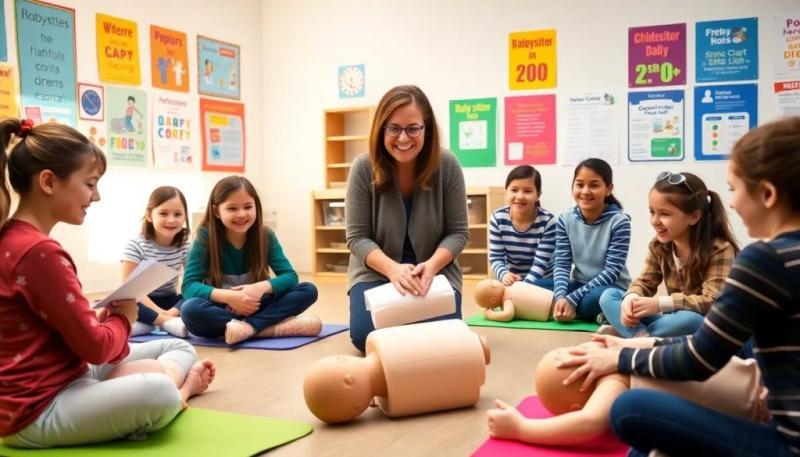When it comes to babysitting, having the right skills is essential not just for the caregiver but also for the safety of the children involved. Understanding how to perform CPR can make a significant difference in emergencies. This article explores the best CPR training courses for babysitters that can prepare you for any situation.
From online classes to in-person workshops, there are various options available to help you become certified. Along the way, we will discuss the importance of CPR training, the costs involved, and how to find the best courses tailored for aspiring babysitters.
What are the best CPR training courses for babysitters?
Choosing the right CPR training course can be overwhelming due to the numerous options available. However, some courses stand out due to their comprehensive content and recognition. The American Red Cross offers an updated Babysitter’s Training course which is highly recommended. This course is designed for youth aged 11-16 and focuses on real-life babysitting skills along with emergency preparedness.
Another excellent option is the American Heart Association CPR certification courses. They provide flexible learning options, such as both online and in-person sessions, to fit busy schedules. Participants gain essential skills in first aid and emergency response, which are invaluable in childcare situations.
- American Red Cross Babysitter Training
- American Heart Association CPR Certification
- Babysitter Boot Camp® Workshop
The Babysitter Boot Camp® Workshop is also noteworthy, preparing teenagers for responsible babysitting through professional marketing techniques and essential caregiving skills. This course emphasizes safety awareness and offers a two-year First Aid and CPR/AED certification upon completion.
How can I get CPR certified as a babysitter?
Getting CPR certified as a babysitter is a straightforward process. First, research local courses offered by reputable organizations like the American Red Cross or the American Heart Association. These organizations often have tailored programs specifically for babysitters.
Once you identify a course, you can choose between online and in-person options. Online classes provide the flexibility to learn at your own pace, while in-person classes offer hands-on experience, which is crucial for mastering CPR techniques.
After completing the course, you’ll receive a certification that is recognized in the childcare industry, enhancing your resume and appeal to potential families.
What certifications do I need to babysit?
While babysitting does not legally require specific certifications, having them significantly enhances your credibility and attractiveness to parents. Common certifications include First Aid, CPR, and sometimes even specialized training in infant and child care.
Many parents feel more comfortable hiring babysitters who are certified, as it indicates a commitment to safety and preparedness. For instance, courses offered by the American Red Cross not only cover CPR but also essential babysitting skills.
- CPR Certification
- First Aid Certification
- Child Care Training Programs
Thus, while you may not need these certifications legally, they are highly recommended for anyone serious about babysitting.
Where can I find CPR training courses near me?
Finding local CPR training courses is easier than ever with online resources. Websites like the American Red Cross and the American Heart Association allow you to search for classes based on your location. These platforms provide information about upcoming courses, costs, and registration details.
You can also check community centers or local hospitals, as they often host CPR training sessions. Local colleges may offer courses as part of their continuing education programs, which can be another excellent resource.
Utilizing search engines with keywords like local CPR training courses for babysitters can yield immediate results, making it easier to find the right fit for your needs.
What is the importance of CPR certification for babysitters?
Obtaining CPR certification is vital for babysitters as it equips them with the skills necessary to respond effectively in emergencies. Knowing how to perform CPR can be lifesaving and offers peace of mind to both the caregiver and the parents.
Parents are often willing to pay a premium for babysitters who are certified because it indicates a higher level of care and responsibility. Research shows that many parents actively seek out certified babysitters, making CPR training a valuable asset in your babysitting career.
Furthermore, CPR training empowers babysitters to handle emergencies with confidence, ensuring that they can act swiftly and correctly when a situation arises.
How much do CPR courses cost for babysitters?
The cost of CPR courses can vary significantly based on the provider and the type of course. Typically, in-person classes range from $50 to $150, while online courses may cost between $30 and $100. Local variations and available promotions can also impact these prices.
Some organizations, like the American Red Cross, offer bundled packages that include CPR training along with First Aid certification at a discounted rate. When looking for affordable CPR training for babysitters, it's wise to compare different options and check for any available scholarships or discounts.
- In-person CPR classes: $50 - $150
- Online CPR training: $30 - $100
- Bundle packages: Often discounted
Investing in CPR training is not just a financial decision; it is an investment in your skills and safety, making it worthwhile for anyone serious about babysitting.
What are the benefits of attending a babysitting course?
Attending a babysitting course goes beyond just learning how to watch children. These courses provide essential skills that boost your confidence and competence as a caregiver. They cover various topics such as safety, age-appropriate activities, and emergency preparedness.
Moreover, many courses offer certifications that can enhance your employability. Parents are more likely to hire babysitters who have completed comprehensive babysitting certification programs, as these certifications validate your skills and knowledge.
- Confidence in handling emergencies
- Knowledge of child care best practices
- Enhanced employability through certifications
In addition to practical skills, babysitting courses often foster networking opportunities with other caregivers, which can lead to job referrals and support within the community.
Related questions about CPR training for babysitters
Frequently asked questions about babysitting and CPR certification
Can I babysit without being CPR certified?
Yes, you can babysit without being CPR certified; however, it is not advisable. While there are no legal requirements mandating CPR certification for babysitters, being certified increases your credibility and safety measures. Parents often prefer hiring babysitters who can demonstrate they have the skills to handle emergencies, thus making it a beneficial choice for anyone serious about babysitting.
What certifications do I need to babysit?
The essential certifications for babysitting include First Aid and CPR. While these are not legally required, they significantly enhance your marketability and reassure parents about their children's safety. Some babysitting courses also offer additional training in areas such as child development and safety regulations which can be beneficial.
How much money do you get for being a certified babysitter with CPR?
The pay for certified babysitters can vary widely based on location, experience, and the specific needs of the family. On average, babysitters with CPR certification can expect to earn between $15 and $25 per hour. Being certified not only increases your potential hourly rate but also makes you more appealing to families seeking responsible caregivers.
Should babysitters know CPR?
Absolutely, babysitters should know CPR. This knowledge can be critical in emergency situations, allowing them to respond promptly and effectively. CPR training provides babysitters with the skills to handle choking, cardiac arrest, and other emergencies. Parents often prefer hiring babysitters who are certified, knowing they have the training to keep their children safe.
Para quienes buscan capacitarse en el cuidado de niños, a continuación, compartimos un video que detalla los mejores cursos de entrenamiento en RCP para niñeras.



